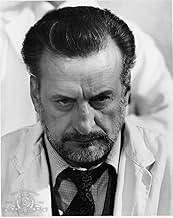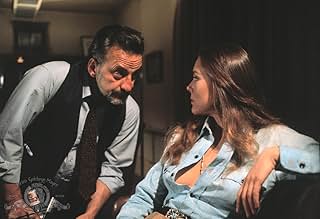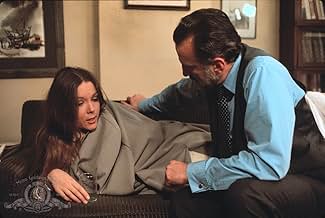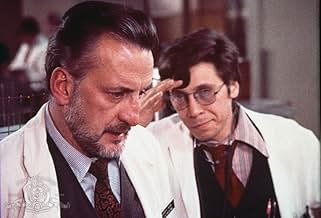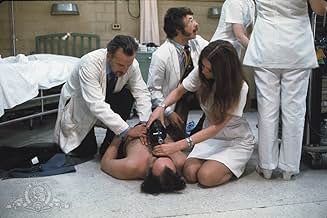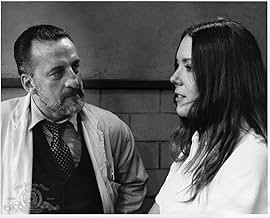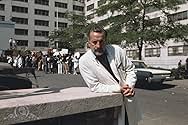VALUTAZIONE IMDb
7,1/10
7756
LA TUA VALUTAZIONE
Aggiungi una trama nella tua linguaA hospital's chief-of-staff struggles to find meaning in his life during a spate of staff deaths.A hospital's chief-of-staff struggles to find meaning in his life during a spate of staff deaths.A hospital's chief-of-staff struggles to find meaning in his life during a spate of staff deaths.
- Regia
- Sceneggiatura
- Star
- Vincitore di 1 Oscar
- 7 vittorie e 5 candidature totali
Richard Dysart
- Dr. Welbeck
- (as Richard A. Dysart)
Recensioni in evidenza
George Scott gave the performance of a lifetime in Paddy Chayefsky's THE HOSPITAL, a very dark drama about an aging big city hospital and a middle-aged physician on the verge of suicide. Along comes Diana Rigg as a free spirit determined to save him from himself. Their dialog crackles, and it is clear they are made for each other from the outset. But will she save him? Their one sex scene is both graphic and memorable for its passion and fury. Meanwhile, the hospital is under siege by a group of agitators who don't want it to turn a condemned building into a cancer center. And a serial killer is loose in the hospital, specializing in doctors and nurses. A good part of the movie, though, is squarely focused on Scott. As it should be. What a difference a few years made back when this movie was made. 1962 had given us THE INTERNS, a hokey, old-fashioned reworking of DR. KILDARE with terrible acting and a cardboard script. Along came 1971 and THE HOSPITAL. Less than 10 years later. Hollywood did something right for a change. Watching THE HOSPITAL today is a reminder of how much medical shows like ST. ELSEWHERE and SCRUBS owe to this enduring classic. And if THE HOSPITAL reminds you of NETWORK, it should. Same scripter.
Hospital (1971)
George C. Scott is amazing, just terrific as a struggling, aging, world-weary doctor. A couple of the speeches he gives (from the sharply written screenplay) are first rate quotable stuff. See this movie for him alone.
Overall, this is certainly a New Hollywood movie, straight out of the late 1960s politics and sexual revolution. It's also a bit of a middle-aged male fantasy (the director and writer and main actor being of course all middle aged males). I mean, a key line in the movie is when young and slightly batty Barbara, played by Diana Rigg (Emma Peel in the television series "The Avengers"), says to the very middle aged George C. Scott, "I have a thing for middle aged men." Or something to that effect--and you know what happens next.
But that's the weakest part of the movie. The best part is the hospital scene itself, the chaotic and scary lack of medical professionalism at an under-funded big city medical center. Scott plays the chief of medicine, Dr. Bock, and he gradually sniffs out a truly murderous element to the place, a kind of whodunnit built into this otherwise growing drama of doctors inside and protesters outside (usually) and a general sense that the old order isn't able to keep order against the rising restlessness of young people and their demands.
In a way, the flakiness of Barbara and the rock-steady but yet suicidal authority of Bock are symbolic of the two sides, the two generations, that signified so much back then. Barbara suggests dropping out and turning on, and the doctor grows to the idea. I mean, who wouldn't in his shoes, having Diana Rigg begging you to leave your miserable job and life and moving to the mountains of Mexico to make babies. That's no exaggeration--that's the carrot, and the doctor sees it the way many people saw it then, the escape as a reasonable alternative to a crumbling world.
And yet, the hospital has needs, like dying people, and a group of people displaced from their apartment building next door, and of course this murderer on the loose.
In a way, it's a sloppy, terribly constructed movie. But it has an element of abandonment and realism from the era that really works. If you just go along with the superficial parts of the plot, which are fun, you might just get sucked into the tawdry medical world in 1971 Manhattan.
The writer, by the way, is Paddy Chayefsky, and he won his second Oscar for this screenplay. It was considered that timely and sharp at the time, and there is some terrific writing, some really good dialog to keep it humming. (He did a ton of television, but also next wrote the screenplay for "Network," winning his third Oscar for that.)
The director, Arthur Hiller, moved from 1960s television to movie directing and made a lot of middling fare, though a few became well known such as "Love Story" (1970) and "Man of La Mancha" (1972). The cinematographer Victor J. Kemper is straight out of New Hollywood and his style feels beautifully unpolished and complex (he went on to do a lot of solid movies, some really terrific like "Dog Day Afternoon"), and this helps hold the disparate plot elements together.
George C. Scott is amazing, just terrific as a struggling, aging, world-weary doctor. A couple of the speeches he gives (from the sharply written screenplay) are first rate quotable stuff. See this movie for him alone.
Overall, this is certainly a New Hollywood movie, straight out of the late 1960s politics and sexual revolution. It's also a bit of a middle-aged male fantasy (the director and writer and main actor being of course all middle aged males). I mean, a key line in the movie is when young and slightly batty Barbara, played by Diana Rigg (Emma Peel in the television series "The Avengers"), says to the very middle aged George C. Scott, "I have a thing for middle aged men." Or something to that effect--and you know what happens next.
But that's the weakest part of the movie. The best part is the hospital scene itself, the chaotic and scary lack of medical professionalism at an under-funded big city medical center. Scott plays the chief of medicine, Dr. Bock, and he gradually sniffs out a truly murderous element to the place, a kind of whodunnit built into this otherwise growing drama of doctors inside and protesters outside (usually) and a general sense that the old order isn't able to keep order against the rising restlessness of young people and their demands.
In a way, the flakiness of Barbara and the rock-steady but yet suicidal authority of Bock are symbolic of the two sides, the two generations, that signified so much back then. Barbara suggests dropping out and turning on, and the doctor grows to the idea. I mean, who wouldn't in his shoes, having Diana Rigg begging you to leave your miserable job and life and moving to the mountains of Mexico to make babies. That's no exaggeration--that's the carrot, and the doctor sees it the way many people saw it then, the escape as a reasonable alternative to a crumbling world.
And yet, the hospital has needs, like dying people, and a group of people displaced from their apartment building next door, and of course this murderer on the loose.
In a way, it's a sloppy, terribly constructed movie. But it has an element of abandonment and realism from the era that really works. If you just go along with the superficial parts of the plot, which are fun, you might just get sucked into the tawdry medical world in 1971 Manhattan.
The writer, by the way, is Paddy Chayefsky, and he won his second Oscar for this screenplay. It was considered that timely and sharp at the time, and there is some terrific writing, some really good dialog to keep it humming. (He did a ton of television, but also next wrote the screenplay for "Network," winning his third Oscar for that.)
The director, Arthur Hiller, moved from 1960s television to movie directing and made a lot of middling fare, though a few became well known such as "Love Story" (1970) and "Man of La Mancha" (1972). The cinematographer Victor J. Kemper is straight out of New Hollywood and his style feels beautifully unpolished and complex (he went on to do a lot of solid movies, some really terrific like "Dog Day Afternoon"), and this helps hold the disparate plot elements together.
The Hospital's one big flaw is lack of decision. It tries to hit too much and fails at most. At its best, The Hospital is a fantastic character study; George C. Scott is fantastic, giving one of the best performances of his celebrated career, and he creates a complex, flawed, believable character over the course of the film. The supporting cast is fine too - Barnard Hughes is hammy but terrific, and the others do well too. The film has some fantastic character establishing dialogs that are the heart of the story.
The problem is that it isn't satisfied with being a character driven drama. The Hospital also dips into black comedy, social satire, murder mystery and romance, and when it goes anywhere near any of those, it becomes disappointingly bland and predictable. Unfortunately, those scenes take up over half of the film.
On a side note, I do recommend The Hospital to anyone with an obsession for medical dramas - It's more realistic and better researched than most such movies made before ER.
The problem is that it isn't satisfied with being a character driven drama. The Hospital also dips into black comedy, social satire, murder mystery and romance, and when it goes anywhere near any of those, it becomes disappointingly bland and predictable. Unfortunately, those scenes take up over half of the film.
On a side note, I do recommend The Hospital to anyone with an obsession for medical dramas - It's more realistic and better researched than most such movies made before ER.
It's hard to tell in this scenario. We've all heard about (or maybe even experienced) some quirky stuff in hospitals, but this one (fashioned by Paddy Chayefsky) really takes the cake.
Seldom has there been such an odd assortment of patients, staff and docs under one roof. Agreed some reforms are needed in the medical profession which warrant exposing.
But Chayefsky creates a circus, replete with sexually maladjusted interns, an Indian medicine man performing out-patient rites, and a mad killer stalking the corridors for victims and bopping them over the head. That George C. Scott keeps a straight face must be one of the great acting feats of '71.
The script goes so over-the-top that it gives that term a new meaning. Enough to make one want to cancel their Medicare and go alternative all the way.
Where's that grape seed extract and Noni juice?
Seldom has there been such an odd assortment of patients, staff and docs under one roof. Agreed some reforms are needed in the medical profession which warrant exposing.
But Chayefsky creates a circus, replete with sexually maladjusted interns, an Indian medicine man performing out-patient rites, and a mad killer stalking the corridors for victims and bopping them over the head. That George C. Scott keeps a straight face must be one of the great acting feats of '71.
The script goes so over-the-top that it gives that term a new meaning. Enough to make one want to cancel their Medicare and go alternative all the way.
Where's that grape seed extract and Noni juice?
Anybody who goes to the Manhattan Hospital Center is taking his life in his hands. That includes the staff of The Hospital.
I had never seen The Hospital before and I was intrigued at how similar the characters and situations of the plot were to that other Paddy Chayefsky masterpiece, Network. There are elements in George C. Scott's character that have both Al Schumacher's and Howard Beale's.
He's the administrator of The Hospital and he's mad as hell and not going to take it any more. He's completely estranged from his wife and kids. It takes a Faye Dunaway type character in the person of Diana Rigg to make him snap out of it. One roll in the hay with her and he's shocked back to reality and the fact he still can contribute in the world.
But first he's got a real problem. Someone is out killing hospital staff, four of them in a 48 hour period. And the nice part is their deaths can be attributed to in large part to the general incompetence of a medical bureaucracy. That's where the comedy comes in.
There is an actual Howard Beale type character in the person of Barnard Hughes, Diana Rigg's father. His end is not quite as dramatic as Beale's though.
Back in my working days it was part of my job to pay medical suppliers. Some of them could be as big creeps as you'll find portrayed in The Hospital. The black comedy satire had some real bite to it for me.
George C. Scott was nominated for Best Actor, but having won and refused to accept the previous year's Oscar for Patton, he wasn't about to get a second chance. He lost to Gene Hackman for The French Connection. Still his handling of the role is unforgettable.
Try viewing The Hospital back to back with Network and see how many similarities you spot.
I had never seen The Hospital before and I was intrigued at how similar the characters and situations of the plot were to that other Paddy Chayefsky masterpiece, Network. There are elements in George C. Scott's character that have both Al Schumacher's and Howard Beale's.
He's the administrator of The Hospital and he's mad as hell and not going to take it any more. He's completely estranged from his wife and kids. It takes a Faye Dunaway type character in the person of Diana Rigg to make him snap out of it. One roll in the hay with her and he's shocked back to reality and the fact he still can contribute in the world.
But first he's got a real problem. Someone is out killing hospital staff, four of them in a 48 hour period. And the nice part is their deaths can be attributed to in large part to the general incompetence of a medical bureaucracy. That's where the comedy comes in.
There is an actual Howard Beale type character in the person of Barnard Hughes, Diana Rigg's father. His end is not quite as dramatic as Beale's though.
Back in my working days it was part of my job to pay medical suppliers. Some of them could be as big creeps as you'll find portrayed in The Hospital. The black comedy satire had some real bite to it for me.
George C. Scott was nominated for Best Actor, but having won and refused to accept the previous year's Oscar for Patton, he wasn't about to get a second chance. He lost to Gene Hackman for The French Connection. Still his handling of the role is unforgettable.
Try viewing The Hospital back to back with Network and see how many similarities you spot.
Lo sapevi?
- QuizWhen Dr. Herbert Bock rants, "We have established the most enormous, medical...entity ever conceived and people are sicker than ever!" the slight pause, searching for the word "entity", was spontaneously ad-libbed by George C. Scott to save the take. The scripted line was, "we have ASSEMBLED the most enormous medical ESTABLISHMENT ever conceived." Scott heard his slip in mid-sentence, so he reworded the line so as to not make it repetitive. Director Arthur Hiller loved the save so much he used that take in the movie.
- BlooperBarbara Drummond says that she lived for a year with the Hopi Indians, but she mispronounces "Hopi" as "Ho-pye."
- Citazioni
Herbert Bock: I mean, where do you train your nurses, Mrs. Christie--Dachau?
- Curiosità sui creditiAlthough Barnard Hughes played two distinct roles, the end credits lists Hughes as playing the role of Drummond but not Dr. Mallory.
- ConnessioniFeatured in Best! Movies! Ever!: Hospitals (2007)
I più visti
Accedi per valutare e creare un elenco di titoli salvati per ottenere consigli personalizzati
- How long is The Hospital?Powered by Alexa
Dettagli
- Data di uscita
- Paese di origine
- Lingua
- Celebre anche come
- Hospital
- Luoghi delle riprese
- Azienda produttrice
- Vedi altri crediti dell’azienda su IMDbPro
Botteghino
- Lordo Stati Uniti e Canada
- 19.711.560 USD
Contribuisci a questa pagina
Suggerisci una modifica o aggiungi i contenuti mancanti

Divario superiore
By what name was Anche i dottori ce l'hanno (1971) officially released in India in English?
Rispondi

